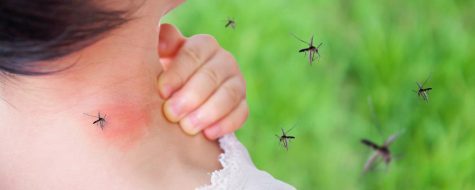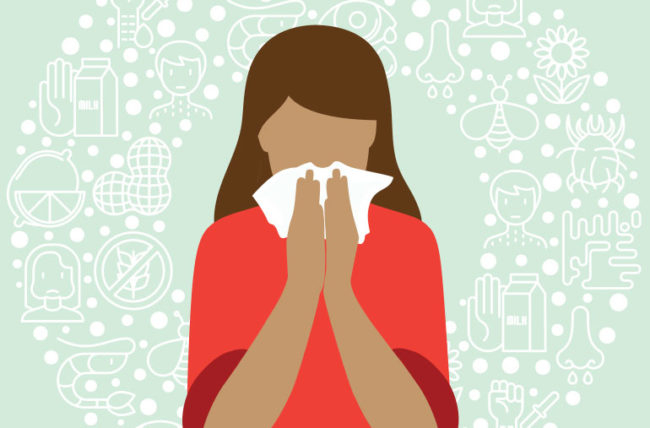Sneezy Season
It may be a common experience, but facing allergies can be a struggle.
Allergy season is drawing closer and closer. Within a few months, sneezes will surround the air around us and the sound of noses blowing will fill rooms everywhere. On top of allergies going around, COVID makes things even more complicated, trying to differentiate between the seasonal allergies and COVID.
Although seasonal allergies affect many people, there are other allergies people face, such as the infamous peanut allergy or a cat allergy that affect them more seriously. Sometimes, allergies can take the best of people, limiting activities or eating delicious foods.
Senior Dalia Khalafalla suffers from many allergies, ranging from strawberries to sunflowers. Khalafalla has had allergies for many years and sometimes, her allergies get the better of her.
“In kindergarten we planted and grew sunflowers. This one kid told me to feel the leaf because it was really soft. Instead of feeling the leaf with my hand like a normal person, I decided to rub my entire face with this super soft sunflower leaf. After a little bit my face swelled up and I went to the hospital,” Khalafalla said.
Khalafalla’s story raises several questions about allergies. How do allergies form? Are people born with allergies or are allergies developed over time? Do allergies get worse with age?
According to Mayo Clinic, allergies occur when the immune system reacts to a foreign object and identifies them as a harmful object. People are capable of getting allergies when they are born and later in life. Although many people tend to grow out of their allergies, some may experience their allergies get worse with age as the immune system gets weaker as one gets older.
There is no question that allergies can bring out the worst reactions in people. In 1963, two British immunologists Robert Coombs and Philip Gell classified four different types of allergic reactions: Immediate, in which symptoms appear within seconds to minutes, cytotoxic, symptoms appear after minutes or hours, immune complex-mediated, symptoms appear after several hours, and delayed hypersensitivity, where symptoms appear after several hours or days later. Whether allergic reactions appear within seconds or days of exposure, it is important to stay cautious with allergies.

In the case for junior Emily Miller, she has had several instances where her allergic reaction got the better of her. Miller faces a variety of allergies, ranging from cats to makeup products. As a member of the school’s show choir, it is required that makeup is needed while performing.
“It mostly limits me in using products. I’m allergic to a lot of makeup, not sure what it is though. It’s hard performing because it’s almost impossible to wear lipstick without breaking into hives like three hours after,” Miller said.
The seasonal allergies are something we’re all too familiar with. Having itchy and watery eyes combined with sneezing every few minutes is nothing new. While seasonal allergies are on it’s way with spring coming up, one may confuse having allergies with having COVID.
Although both allergies and COVID contain runny nose as a symptom, there are many differences between the two. Some COVID symptoms that allergies do not share are body aches, fever, or a loss of taste or smell. Still, it is important to stay cautious with both the seasonal allergies and COVID.
Allergies may impede on one’s life, but fortunately, some people are able to grow out of their allergies. According to Natalie Silver of Healthline, “You may outgrow allergies. Some experts believe that tolerance to allergens may develop as a person is exposed to very low levels of the allergen over time.” Still, it is important for people to be mindful of those with allergies to prevent the dangerous and severe reactions.
Your donation will support the student journalists of Elkhorn North High School. Your contribution will allow us to purchase equipment and cover our annual website hosting costs.












